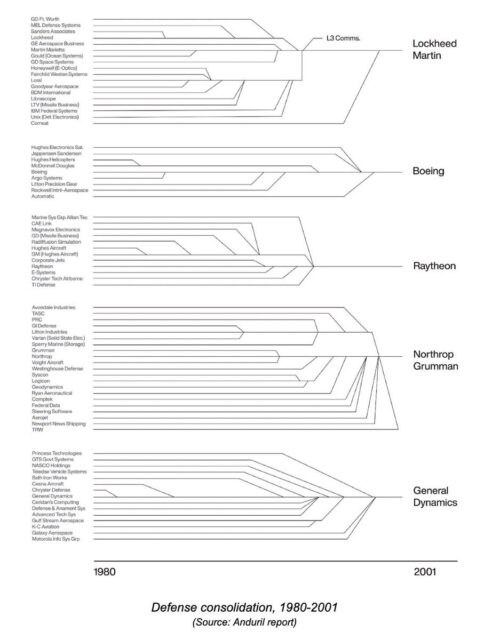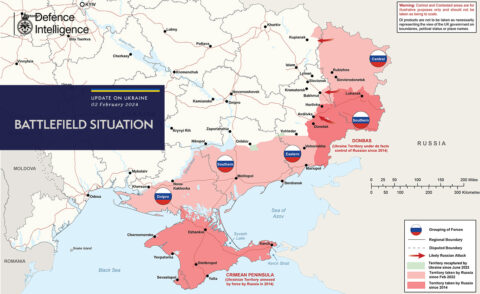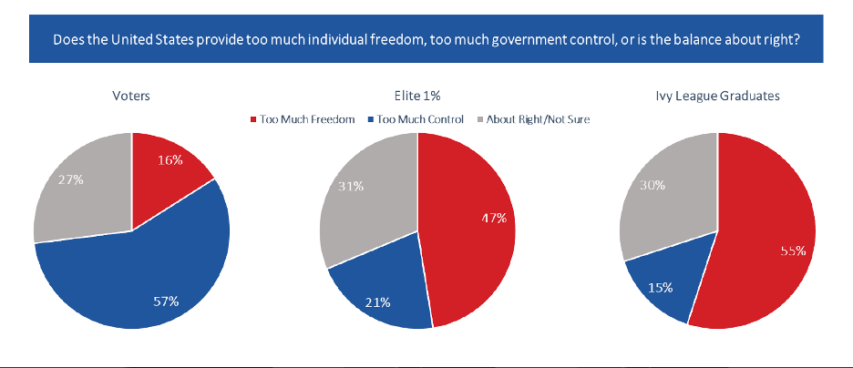Classic Vehicle Channel
Published Apr 23, 2020The military have finished with their amphibious truck know as the DUKW. They’re sold off to the general public for use in civilian life, including divers and even a group of monks.
February 12, 2024
Look at Life – Amphibian DUKW (1962)
February 11, 2024
To “protect our democracy”, we’re only going to have one name on the ballots
Chris Bray chronicles the efforts of the brave men, women, and the other 57 genders to protect our democracy by keeping would-be dictators, wreckers, and looters off the ballot in as many states as possible (perhaps all 57 if things go well):
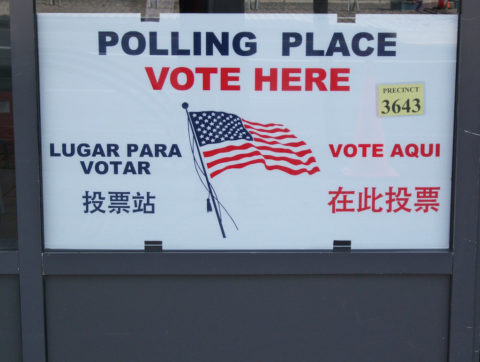
“Polling Place Vote Here” by Scott Beale is licensed under CC BY-NC-ND 2.0 .
As Democrats try to force Donald Trump off the ballot, and Democratic prosecutors charge him with crimes, they’ve also just opened an effort to keep Robert F. Kennedy, Jr. off the ballot with a complaint that could lead to civil penalties, an injunction against signature-gathering activity for ballot access, and criminal charges. You see where this is going.
The Democratic National Committee has filed a complaint with the Federal Election Commission (FEC) against Kennedy., alleging violations of federal campaign finance law. The complaint also names the Kennedy campaign and a PAC, American Values 2024, alleging that the PAC and the campaign are illegally coordinating campaign activities. You can read that complaint by clicking here, or by opening the PDF file below:
The heart of the complaint is on pg. 2 (footnotes removed, but available at the link or in the PDF):
American Values 2024 has stated it will spend approximately $15 million to assist Mr. Kennedy’s efforts to earn a place on the ballot in the states in which it is most difficult for Mr. Kennedy to achieve that goal, including Arizona, California, Georgia, Illinois, Michigan, New York, Colorado, Nevada, Indiana, West Virginia, South Carolina, Maryland, Massachusetts, and Texas. American Values 2024 will do this by collecting signature petitions in each state to assist Mr. Kennedy’s efforts to qualify for a place on the ballot.
In all the states in which American Values 2024 has announced it will assist Mr. Kennedy’s efforts to get on the ballot, state law presumes – and in most states requires – that the candidate or the campaign committee will take the steps necessary to qualify for the ballot…Put simply, to qualify for the ballot under state law, American Values 2024 must coordinate its activity with Mr. Kennedy and his campaign in a way that violates federal campaign finance laws.
The FEC has civil enforcement authority, and the DNC complaint asks the FEC to “seek such monetary, declaratory or injunctive relief as necessary to remedy these violations.”
The Battle of Manila Begins – WW2 – Week 285 – February 10, 1945
World War Two
Published 10 Feb 2024The American advance on Luzon has reached the Philippine capital, and it looks like they have a real fight on their hands with the Japanese there. There are supposed to be two new Allied operations starting in Western Europe, but one is delayed by flooding. The Allies do manage to eliminate the Colmar Pocket in the west, though. On the Eastern Front, there are new Soviet attacks in Pomerania and East Prussia, as well as out of the Steinau Bridgehead to the south, and in Budapest, it looks like the Soviet siege might soon end in victory.
(more…)
QotD: Learning and re-learning the bloody art of war
The values composing civilization and the values required to protect it are normally at war. Civilization values sophistication, but in an armed force sophistication is a millstone.
The Athenian commanders before Salamis, it is reported, talked of art and of the Acropolis, in sight of the Persian fleet. Beside their own campfires, the Greek hoplites chewed garlic and joked about girls.
Without its tough spearmen, Hellenic culture would have had nothing to give the world. It would not have lasted long enough. When Greek culture became so sophisticated that its common men would no longer fight to the death, as at Thermopylae, but became devious and clever, a horde of Roman farm boys overran them.
The time came when the descendants of Macedonians who had slaughtered Asians till they could no longer lift their arms went pale and sick at the sight of the havoc wrought by the Roman gladius Hispanicus as it carved its way toward Hellas.
The Eighth Army, put to the fire and blooded, rose from its own ashes in a killing mood. They went north, and as they went they destroyed Chinese and what was left of the towns and cities of Korea. They did not grow sick at the sight of blood.
By 7 March they stood on the Han. They went through Seoul, and reduced it block by block. When they were finished, the massive railway station had no roof, and thousands of buildings were pocked by tank fire. Of Seoul’s original more than a million souls, less than two hundred thousand still lived in the ruins. In many of the lesser cities of Korea, built of wood and wattle, only the foundation, and the vault, of the old Japanese bank remained.
The people of Chosun, not Americans or Chinese, continued to lose the war.
At the end of March the Eighth Army was across the parallel.
General Ridgway wrote, “The American flag never flew over a prouder, tougher, more spirited and more competent fighting force than was Eighth Army as it drove north …”
Ridgway had no great interest in real estate. He did not strike for cities and towns, but to kill Chinese. The Eighth Army killed them, by the thousands, as its infantry drove them from the hills and as its air caught them fleeing in the valleys.
By April 1951, the Eighth Army had again proved Erwin Rommel’s assertion that American troops knew less but learned faster than any fighting men he had opposed. The Chinese seemed not to learn at all, as they repeated Chipyong-ni again and again.
Americans had learned, and learned well. The tragedy of American arms, however, is that having an imperfect sense of history Americans sometimes forget as quickly as they learn.
T.R. Fehrenbach, This Kind of War: A Study in Unpreparedness, 1963.
February 10, 2024
The War Goals to End WW2 in 1945 – a WW2 Special
World War Two
Published Feb 8, 2024While World War Two looks like it is about to end, the belligerent powers have vastly different goals for that end. Differences that may or may not prolong the war, will decide the survival of tens of millions of people, and the future fate of all of Humanity.
(more…)
February 9, 2024
You can’t pro-actively synergize action-oriented metrics in the heat of battle
No, I’m not sure if that headline makes any sense, as I was never particularly receptive to the latest buzzwords of any given management fad that went through from the 70s onwards. They all seemed to share a few characteristics along with a bespoke sheaf of buzzwords, PowerPoint slides galore, and lots of spendy courses you had to send all your employees to endure. Is there anything more dispiriting to staff morale than a VP or director who’s just returned from a week-long training seminar in an exotic location on this year’s latest “revolutionary” “transformational” management fad?
It’s bad when companies that make widgets or smartphone apps or personal hygiene products fall for these scams, but it’s terrifying to discover that your military isn’t immune … and in fact revel in it:
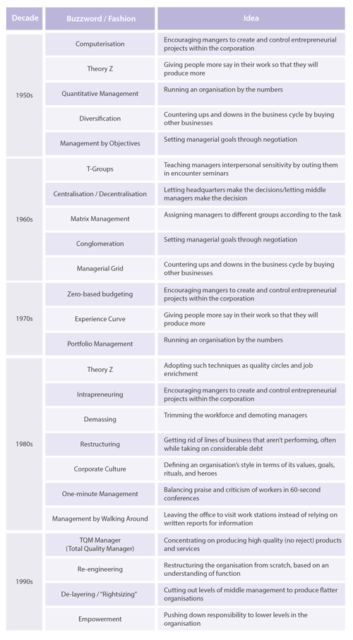
Image from “Fads and Fashions in Management”, The European Business Review, 2015-07-20.
https://www.europeanbusinessreview.com/fads-and-fashions-in-management/
We spent these last few decades since the fall of the Soviet Union weaving a comfortable web of CONOPS and implemented “efficiencies” constructed of consultant-speak, weekend-MBA jargon, and green eyeshade easy-buttons bluffed from the podium by The Smartest People in the Room™ to an audience on balance populated by people who already had the short list of jobs they wanted once they shrugged off their uniform in a PCS cycle or two.
Agree, endorse, parrot, prepare …. profit!
War is New™!, Revolutionary™!, Transformational™!. Hard power is Offset™! If we change a bunch of simple words in to multi-syllabic cute acronyms … then the future will be ours, our budgets will be manageable, and our board seats will be secured! Efficiency to eleventy!
Facing the People’s Republic of China on the other side of the International Date Line … how efficient do you feel? How effective?
Something very predictable happened in our quarter century roadtrip on the way to Tomorrowland; we realized instead we wound up on Mr. Toad’s Wild Ride instead.
I would like the record to show here in 2QFY24 that this exact problem was discussed in detail back when I was a JO in the mid-1990. This is not shocking to anyone who is wearing the uniform of a GOFO. They lived the same history I did.
We knew we were living a lie that we could sustain a big fight at sea. An entire generation of Flag Officers led this lie in the open and ordered everyone else to smile through it. Ignore your professional instincts, and trust The Smartest People in the Room™.
Once again, Megan Eckstein brings it home;
If U.S. military planners’ worst-case scenario arose in the Pacific — having to defend Taiwan from a Chinese invasion — American military forces would target Chinese amphibious ships.
Without them, according to Mark Cancian, who ran a 2022 wargame for the Center for Strategic and International Studies that examined this exact scenario, China couldn’t invade the neighboring island.
…
U.S. submarines would “rapidly fire everything they have” at the multitude of targets, Cancian said, “using up torpedoes at a much, much higher rate than the U.S. has expected to do in the past.”
Navy jets, too, would join in — but they’d run out of Long Range Anti-Ship Missiles within days, …
It’s this nightmare scenario that’s driving the Navy to increase its stockpile of key munitions: the LRASM, the MK 48 heavyweight torpedo, the Standard Missile weapons and the Maritime Strike Tomahawk, among others.
Over a decade after the Pacific Pivot, a couple of years after the US Navy became the world’s second largest navy after being the worlds largest for living memory of 99% of Americans, and two years after the Russo-Ukrainian War reminded everyone that, yeah … 3-days wars usually aren’t.
And the defence industries of the 1980s and 90s have all swallowed up smaller competitors — again following “normal” business practices of the time, seeking economies of scale and manufacturing efficiencies and closing down less-profitable assembly lines or entire lines of business.
Let’s go back to SECDEF Perry’s 1990s “Last Supper”, you know, the one that was all about the efficiencies of consolidation of the defense industry.
Three decades later, what is the solution to the strategic risk we find ourselves in due to our inability to arm ourselves?
… “the bottleneck is rocket motors” because so few companies are qualified to build them for the United States, Okano explained. To help, the Navy issued a handful of other transaction agreement contracts to small companies who will learn to build the Mk 72 booster and the Mk 104 dual-thrust rocket motor so prime contractors have more qualified vendors to work with, she added.
LOLOLOL … what “small companies?” That ecosystem is “old think”. If we need to go back to that structure, that will take decades not just to build, but decades of a viable demand signal.
Looks like we have started that as “small companies” perhaps repurpose part of their company to a military division. If we can just stop them from being gobbled up by the primes, it might be nice to return to a more robust, competitive ecosystem. Soviet-like consolidation and McNamaraesque efficiencies got us here, perhaps time to try something old as new again.
Nothing is less efficient to go to war with than a military designed for an efficient peace.
February 8, 2024
North American newspaper economics
Tim Worstall discusses some of the issues ailing Canadian and American newspapers which are not easily solvable (government subsidies, as attempted in Canada, just turn the recipients into an underpaid PR branch of the governing party … not a good look in a democratic nation):
So, as a little corrective, a quick jaunt through what actually ails American journalism. The concentration is upon the big newspapers because that’s where the problem is worst. The conclusion is that it’s gonna get a lot, lot, lot, worse too. Because the industry is facing a base economic problem that it’s not willing to actually face up to. Or, at least, all the journalists writing about it aren’t — there’s the occasional sign that some of the business side of the equation grasp it.
[…]
Before Y2K American newspapers were segmented along geographic lines. The size of the country, the lack of a long distance passenger railroad network, meant that this was just so. If you’re printing a daily paper then you’ve got to deliver it daily. On the day it’s meant to refer to as well. If Chicago is 1,100 miles (no, I’ve not looked it up but that’s within an order of magnitude of being right, which is better than many newspapers manage with numbers) from New Orleans then the same newspaper is going to find it difficult to print and deliver to both markets. Add in the fact that trains take a week to traverse that distance, passenger trains – anyone who has ever travelled Amtrak will say it feels that long at least — included.
You could not and therefore did not have national newspaper (USA Today, with satellite printing plants, was an attempt to deal with this and slightly earlier than our cut off date but doesn’t change the basic story) distributions. What you had was a series of local and regional monopolies. Each one centred on a large population centre and serving the area around it that could be reasonably reached by truck overnight. Chicago and Cincinnati, not 1,100 miles away from each other, did have entirely different newspapers.
By contrast, and just as an example, the British newspaper market was national from pre-WWI. We simply did have overnight at worst passenger rail that covered the country. Partly it’s a much, much, smaller place, partly the passenger rail system was just different. So, printing overnight (and some maintained separate Scottish editions and plants) meant that those papers that came off the press in London at 8pm were on sale in Glasgow at 8 am, those that came off the press in London at 4 am were on sale in London at 8am. That’s not exact but it’s a good enough pencil sketch.
Cincinnati newspaper(s) served Cincinnati. Chicago, Chicago and New Orleans the area of New Orleans. There simply wasn’t a “national press” in the US in that British sense.
OK. But this also meant that American newspapers were much more like a monopoly in their local area than anything else. Network effects still exist even before computer networks after all. The most important of which was the classifieds.
As with Facebook, we’re all on Facebook because everyone else is on Facebook. So, if we’re to join a social network we’re going to be on Facebook where everyone else is — except those three hipsters who are where it isn’t cool yet. This applies to classifieds sections. Folk advertise in the one with the most readers, the widest market. Readers buy the one with the most ads in it, the widest market. You advertise the bronzed baby shoes, unused, where there are the most people looking for bronzed baby shoes, unused.
So, the dominant paper will suck up the classifieds in any particular market. Classifieds, fairly obviously back in the days of prams, cheap used cars, waiters’ jobs and so on being geographically based.
No, this is important. A useful pencil sketch of American newspaper revenues pre-Y2K was that subscriptions produced some one third of revenues. They also, around and about, covered print costs and distribution. They were, roughly you understand, about a face wash in fact.
Display ads produced another one third and classifieds the final one third. Classifieds were also wildly profitable — no expensive journalists to pay, no bureaux, just a few women waiting to get married on the end of the phone line.
QotD: Partisan media
Conservative media is mainly designed to provide its readers with information. But liberal media is designed to give its readers permission to think certain thoughts. It’s not so much that the Politico article was informing democrats about certain uncomfortable Biden facts for the first time, although that is certainly true.
The article was more significant because it signaled to democrats that now acceptable to talk about Biden lying and about his being mixed up with all these sketchy characters.
Jeff Childers, “ONE YEAR ☙ Monday, November 6, 2023 ☙ C&C NEWS”, Coffee & Covid 2023, 2023-11-06.
February 7, 2024
February 6, 2024
The Sky People hold very different beliefs to those untouchable Dirt People
Rob Henderson says that the gap is “Grand Canyon-sized” between ordinary Americans and the Ivy League grads who cluster at the top of every progressive organization:
55% of Ivy League graduates believe that the U.S. “provides too much individual freedom” compared with just 16% of ordinary U.S. voters.
Back in 2019, as I was developing what became the luxury beliefs framework, I read a recently issued chapter published by Cambridge University Press titled “Why Are Elites More Cosmopolitan than Masses?”
Authored by a team of social scientists, this 2019 paper reports stunning gaps in political views and outlooks between elites and ordinary people in various western countries.
In the introduction, they suggest that elite attitudes are expressions of cultural capital. That is, the large gap in views between elites and everyone results from elites drawing symbolic boundaries between themselves and the provincial masses.
Indeed, another report found that 65 percent of Americans believed that the most educated and successful people in America are more interested in serving themselves than in serving the common good. This view is held across the board — across age, gender, race, political party, and ideology.
The authors of the 2019 chapter write:
Mastering intricacies of gender and race relations discourse and behavior has become a marker for belonging to the cosmopolitan class, in a similar way that tastes for classical music and art were markers of bourgeois culture in the 19th and 20th centuries.
Interestingly, the researchers find that social background and ideological affinities account for elite similarities more so than educational attainment. This might be one reason why, despite obtaining the same degrees from the same institutions as many elites, I still retain an outlook reflective of my provincial upbringing.
Following my experiences in the Los Angeles county foster system, my adoptive family and I settled in a dusty lower-class town in the northernmost region of California—a place just as provincial as any rundown neighborhood in flyover country—where I spent most of my youth.
The authors of the paper measured the opinions of elites (those holding the highest positions in each sector) across various fields including politics, finance, academia, and media, as well as the opinions of ordinary people.
Relative to the masses, elites are more likely to agree with statements such as “We should do everything possible to fight climate change, even if it slows economic growth.”
And elites are more in favor of allocating authority not to local or national governments, but to global organizational bodies (e.g., the U.N.).
The researchers also found that elites are significantly more pro-immigration, as measured by the extent to which they agreed with statements like “When jobs are scarce, employers should give priority to people of [this country.]”
I thought about those results for a long time. Especially as I came across another study indicating that educated people are more likely to express prejudice toward immigrants who are described as highly educated, relative to less educated, and are therefore seen as job competitors.
Among university students, attitudes toward immigrants were most negative when the immigrants had a university education, and most positive when the immigrants had little to no formal education. It’s nice for the educated class when immigrants provide cheap hired help and open interesting restaurants. They’re less excited when immigrants are competing with them for the same jobs. If thousands of people with bachelor’s and postgraduate degrees from, say, China and India, were unlawfully entering the U.S. each day, my guess is current elite attitudes around border security would be very different.
In a way, it’s rather reassuring that the Sky People are still demonstrably human, based on the change in opinions when it’s their ox being gored …
February 5, 2024
Sitzkrieg on the southern border
Glenn “Instapundit” Reynolds on the stand-off between Texas governor Greg Abbot and President Joe Biden over the flood of illegal immigrants coming across the US-Mexican border:
So the war over the border between Texas and the Biden Administration is now in the “Sitzkrieg” stage. Texas Gov. Greg Abbott has essentially declared war on illegal immigration. He invoked Article I Section 10 of the United States Constitution, which forbids states from declaring war except when “actually invaded” (or in such imminent danger as to admit of no delay) and, by implication, allows them to declare war when that happens. He also invoked the Guarantee Clause of Article IV, which requires the federal government to protect the states against invasion.
Abbott’s legal argument is that since he’s being invaded, he’s entitled to respond, and since the federal government is defaulting on its obligations it has no business – it’s basically stopped from – complaining. There was a lot of huffing and puffing at the time, with members of Congress calling on President Biden to federalize the Texas National Guard and the like, but basically, nothing happened. The Supreme Court vacated an injunction forbidding the Border Patrol from cutting the barbed wire that Texas had installed along the border, but – contrary to many media reports – didn’t rule that what Texas had done was illegal, or order Texas to stop policing the border.
Now not much is going on. The big complaints about immigration are mostly coming from outside Texas, places like New York City where illegal immigrants beat police with impunity, being released without bail after being arrested. (The usual endgame for this sort of thing in other societies has been death squads, organized either by police or by police-adjacent groups, taking out those whom the legal system cannot or will not control; we’ll see what happens in New York City.)
But next month Texas’s law allowing the state to apprehend and effectively deport illegals will go into effect, and that’s when the sitzkrieg is likely to end. Following are my (very) preliminary thoughts.
To me what’s astonishing is how unpopular with everyone the immigration policies of the Administration – and a good chunk of the GOP – are. Open borders are unpopular with blacks, whites, rural and urban voters, and, really, just a vast bipartisan majority. But like “climate change”, another priority of the ruling class without matching popular support, the borders stay open.
Why? Because our ruling class seeks, in Bertolt Brecht’s famous phrase, “to dissolve the populace and elect another”. As Elon Musk tweeted:
Musk’s comments met with the usual outrage, but Democrats have pretty much touted this as the plan for years. Indeed, it goes back to Ruy Teixeira’s “Emerging Democratic Majority” strategy, though it’s been accelerated in recent years. (And Teixeira himself has retreated from that plan). Sure, naturalization takes years – though they may speed that up, as it’s just a matter of statute – and there have also been some moves to allow non-citizens to vote anyway. Think that’s unlikely? Maybe, but how many things are happening these days that seemed impossibly unlikely a few years ago? And it’s a long game; a bunch of Democratic voters in 5 or 6 years will suit them fine.
Western Front Tank Warfare 1944
World War Two
Published Nov 8, 2023Indy takes a look at the armoured beasts battling it out on the Western Front. On the German side we have vehicles like the long-serving Panzer IV, the sleek and modern Panther, and the obnoxiously heavy King Tiger. These are arrayed against the American stalwart, the M4 Sherman, and British tanks like the up-gunned Firefly, Cromwell, and Churchill.
(more…)
QotD: The history of slavery in America
This is therefore, in its over-reach, ideology masquerading as neutral scholarship. Take a simple claim: no aspect of our society is unaffected by the legacy of slavery. Sure. Absolutely. Of course. But, when you consider this statement a little more, you realize this is either banal or meaningless. The complexity of history in a country of such size and diversity means that everything we do now has roots in many, many things that came before us. You could say the same thing about the English common law, for example, or the use of the English language: no aspect of American life is untouched by it. You could say that about the Enlightenment. Or the climate. You could say that America’s unique existence as a frontier country bordered by lawlessness is felt even today in every mass shooting. You could cite the death of countless millions of Native Americans — by violence and disease — as something that defines all of us in America today. And in a way it does. But that would be to engage in a liberal inquiry into our past, teasing out the nuances, and the balance of various forces throughout history, weighing each against each other along with the thoughts and actions of remarkable individuals — in the manner of, say, the excellent new history of the U.S., These Truths by Jill Lepore.
But the NYT chose a neo-Marxist rather than liberal path to make a very specific claim: that slavery is not one of many things that describe America’s founding and culture, it is the definitive one. Arguing that the “true founding” was the arrival of African slaves on the continent, period, is a bitter rebuke to the actual founders and Lincoln. America is not a messy, evolving, multicultural, religiously infused, Enlightenment-based, racist, liberating, wealth-generating kaleidoscope of a society. It’s white supremacy, which started in 1619, and that’s the key to understand all of it. America’s only virtue, in this telling, belongs to those who have attempted and still attempt to end this malign manifestation of white supremacy.
I don’t believe most African-Americans believe this, outside the elites. They’re much less doctrinaire than elite white leftists on a whole range of subjects. I don’t buy it either — alongside, I suspect, most immigrants, including most immigrants of color. Who would ever want to immigrate to such a vile and oppressive place? But it is extremely telling that this is not merely aired in the paper of record (as it should be), but that it is aggressively presented as objective reality. That’s propaganda, directed, as we now know, from the very top — and now being marched through the entire educational system to achieve a specific end. To present a truth as the truth is, in fact, a deception. And it is hard to trust a paper engaged in trying to deceive its readers in order for its radical reporters and weak editors to transform the world.
Andrew Sullivan, “The New York Times Has Abandoned Liberalism for Activism”, New York, 2019-09-13.


